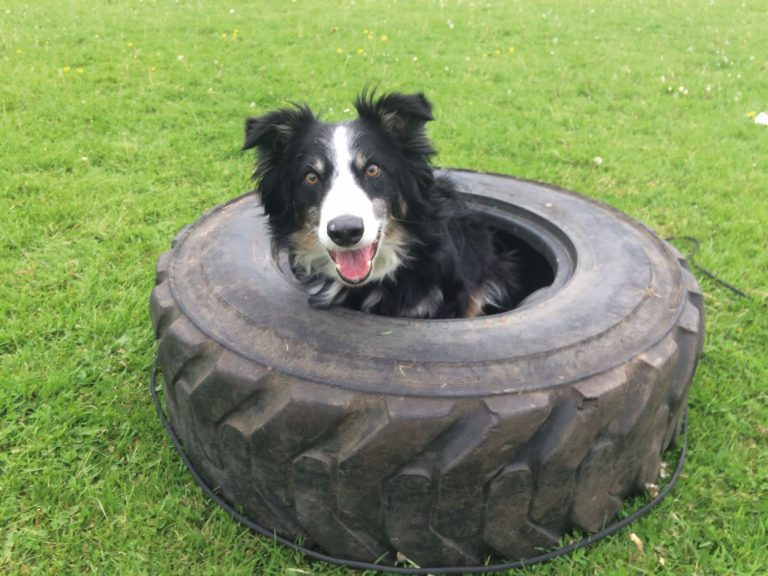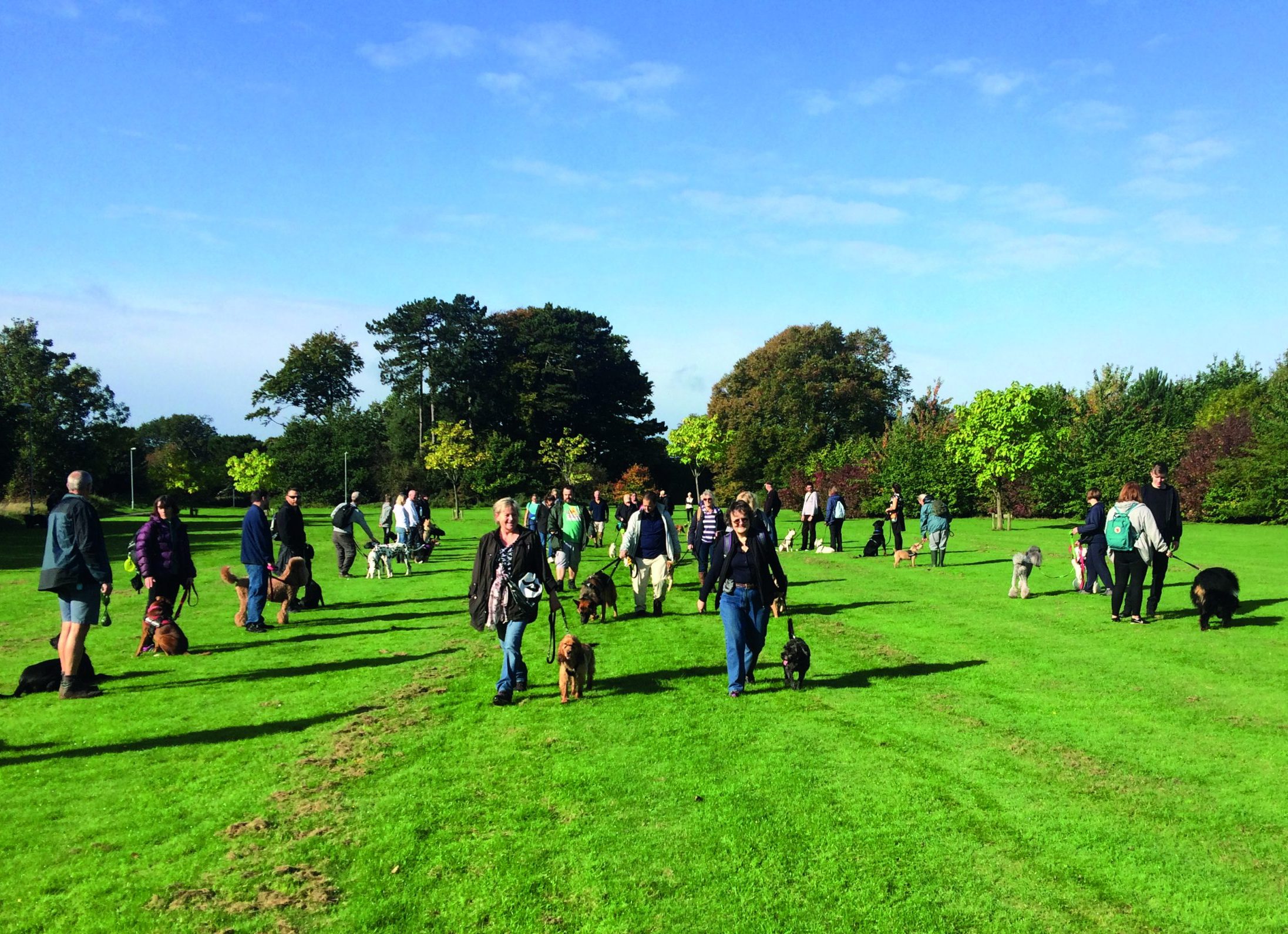On your paws, get set, fetch!
Posted 14th March 2024
Animals in Need relies on a small army of people giving their time to help keep things going – and when it comes to dog training, Nathan Watson ‘leads’ the way….
Those of us old enough to remember Barbara Woodhouse being a regular fixture on the small screen will remember the robust training methods she employed to train our four legged pals.
Had she met the acquaintance of naughty pooch Fenton (hit YouTube if you don’t know) then that viral video with the unsettled deer would never have happened.
Famously, Barbara said that there were ‘no bad dogs’ only bad owners, and Nathan, founder of Dog Rehab agrees that any dog can be trained.
“…but there does have to be realistic expectations and every dog must be treated as in individual when we consider prognosis,” he said, “A 12-year-old dog who has been exhibiting a behaviour most of their life, could potentially be a trickier case than a two year old dog with a similar behaviour that has recently developed. Health concerns play a huge part in many behaviours; we know if we are unwell or in pain, we may be less tolerant with family, friends, and colleagues, so that often has to be ruled out, treated, or managed in dogs first, too.”
His passion for training began back in 2011, borne from a personal experience. “I had previously adopted my Staffie, Bullseye, a beautiful dog who had some challenging behaviours to work with, which inspired me to begin learning about dog behaviour so that I could help him. The passion for dog training grew and I knew it was the path I had to take professionally,” he told Pulse.
Throwing himself into this role, he completed a Foundation Degree in Applied Canine Behaviour and Training and a Bachelor’s Degree in Canine Behaviour Management.
The national media is delighting in fear grabbing headlines about dog attacks, and there is no escaping the fact that there have been terrible fatalities. The XL Bully ban has seen a huge increase in the breed being handed to rescue centres, and euthanised.

As a professional in the industry, how do you view the situation? “Banning breeds does not work. We know this as it’s the very reason we are where we are with the very sad XL Bully situation.” he says, “There are many brilliant dog owners who safely train and manage dogs of all sizes, including the more powerful breeds. However, there are people who want large dogs to use as threats, and when one breed gets banned, they will move on to another breed.
“I expect we will see a rise in the number of incidents involving other large breeds over the coming years. The dog training and behaviour sector are currently completely unregulated, and this has given rise to many completely unqualified people offering their services and using methods that are quite frankly abusive, and potentially dangerous to the dog and the people around them.”
Aside from working as a dog behaviourist, Nathan also works on the committee for the Pet Professional Guild (PPG) which was set up to advocate for ethical pet training.
The global organisation are founding members of the UK Dog Charter, which was put together by many of the UK dog training organisations to ensure there are minimum standards in training and behaviour, to prohibit the use of any aversive methods and equipment including shock collars, prong collars and choke leads.
The UK Dog Charter is an invaluable resource for owners wanting to find a qualified trainer, and to ensure those trainers are accountable.
Progress is being made: “Shock Collars are due to be banned imminently, all being well, but there is a long way to go, and whilst we continue to see abusive methods promoted on platforms from TikTok to TV, we must continue to improve standards to ensure public safety.”
Just like us two legged types, dogs are individuals too, and have their own quirks and struggles. Is it easier to train a big beast, or a tiny terrier?
“It’s certainly easier to deliver a training treat to the mouth of a Labrador, than it is to a Miniature Dachshund who is only a few inches off of the floor, but then a Labrador is a lot stronger and has more potential to pull a person over,” Nathan said, “I never know what a dog is going to be like until I meet them. They’re individuals and a huge part of the job is understanding that and training the dog in front of you. You have to be a problem solver!”
When it comes to training a mutt, there is no set time frame – it’s a case of how long is a dog lead!
“The first few years are likely going to be the most full on, if you have a puppy you’re likely going to have the toilet training, biting, crying at night or when left, stealing things etc, and as they grow they may have a fear stage where things can become scary, then adolescence when impulsivity can be a challenge, so it’s definitely not a case of do a course then you’re all set,” he promises. “You have to establish behaviours and maintain them, just like a weightlifter has to establish strength and then maintain it. There are always new situations that you may decide to train for too, and it’s important to keep a dog’s brain active. Training doesn’t always need to be useful, it can be for bonding and even help to reduce stress, maybe for you and your dog!”
Nathan is a firm believer in giving back and regularly donates his time to Animals In Need, assisting with training of the animals who through no fault of their own find themselves waiting on new homes at the Little Irchester site.
“Animals In Need do such amazing work,” Nathan says, “All of the staff, volunteers, and supporters put in so much time and effort to ensure they can help as many animals, both pets and wildlife, as possible. What they have to deal with every day must be so physically and emotionally draining. Charity founder Roy Marriott has just turned 75 and still works hard every day to save animals. Anything I can do to help, with a bit of advice or fundraising is a must for me.”

One common reason people use as a reason why not to re-home from a rescue centre is, ‘We don’t know its temperament or background’.
“One of the great things is that you can and should get to meet them, walk with them, and start to build a bit of a relationship prior to the adoption,” Nathan advises.
“There may be no major concerns at all, or there may be things that require work or management, but you have a chance to explore some of this beforehand. Of course, things can develop or appear later on, but support is there, and everyone has access to a free group support session.”
What would you say to someone who is looking to rehome a rescue – what should they think about before introducing one into their family?
“Think about the time you can give to a dog, not just in each day, but also the number of years, they could rely on you for 10 to 15 years or even more if you are lucky, so please think about what you can give in the long term; think about the size of the dog, their energy levels, and whether you will be able to hold the lead securely, this is so important!”
Dogs are called man’s best friend with good reason, but we need to be their best pals too. “Take time to understand your dog’s needs, they are doing their best to fit into our world,” Nathan urges, “Set their world up for success; train the behaviours you want, notice all the great things they do, reinforce them regularly, and show them love.”
As the owner of two strong-willed felines, we have to ask; ‘Can cats be trained too?’ “They can definitely be trained, but not by me!” Nathan laughed.
Visit dogrehab.co.uk email nathan@dogrehab.co.uk or call 07958 042381 to see how Nathan can help you and your pooch. You can also find him on FB: NathanWatsonDogBehaviour
Pet Professional Guild: petprofessionalguild.com
UK Dog Charter: dogcharter.uk
